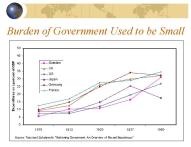
Posted on 04/12/2014 12:21:13 PM PDT by Kaslin

In the pre-World War I era, the fiscal burden of government was very modest in North America and Western Europe.
Total government spending consumed only about 10 percent of economic output,  most nations were free from the plague of the income tax, and the value-added tax hadn’t even been invented.
most nations were free from the plague of the income tax, and the value-added tax hadn’t even been invented.
Today, by contrast, every major nation has an onerous income tax and the VAT is ubiquitous. These punitive tax systems exist largely because – on average - the burden of government spending now consumes more than 40 percent of GDP.
To be blunt, fiscal policy has moved dramatically in the wrong direction over the past 100-plus years. And thanks to demographic change and poorly designed entitlement programs, things are going to get much worse according to BIS, OECD, and IMF projections.
 While these numbers, both past and future, are a bit depressing, they also present a challenge to advocates of small government. If taxes and spending are bad for growth, why did the United States (and other nations in the Western world) enjoy considerable prosperity all through the 20th Century?
While these numbers, both past and future, are a bit depressing, they also present a challenge to advocates of small government. If taxes and spending are bad for growth, why did the United States (and other nations in the Western world) enjoy considerable prosperity all through the 20th Century?
I sometimes get asked this question after speeches or panel discussions on fiscal policy. In some cases, the person making the inquiry is genuinely curious. In other cases, it’s a leftist asking a “gotcha” question.
I’ve generally had two responses.
1. The European fiscal crisis shows that the chickens have finally come home to roost. More specifically, the private economy can withstand a lot of bad policy, but there is a tipping point at which big government leads to massive societal damage.
2. Bad fiscal policy has been offset by good reforms in other areas. More specifically, I explain that there are five major policy factors that determine economic performance and I assert that bad developments in fiscal policy have been offset by improvements in trade policy, regulatory policy, monetary policy, and rule of law/property rights.
I think the first response is reasonably effective. It’s hard for statists to deny that big government has created a fiscal and economic nightmare in many European nations.
But I’ve never been satisfied with the second response because I haven’t had the necessary data to prove my assertion.
However, thanks to Professor Leandro Prados de la Escosura in Madrid, that’s no longer the case. He’s put together some fascinating data measuring economic freedom in North America and Western Europe from 1850-present. And since he doesn’t include fiscal policy, we can see the degree to which there have been improvements in other areas that might offset the rising burden of taxes and spending.
Here’s one of his charts, which shows the growth of economic freedom over time. For obvious reasons, he doesn’t include the periods surrounding World War I and World War II, but those gaps don’t make much of a difference. You can clearly see that non-fiscal economic freedom has improved significantly over the past 150-plus years.
Most of the improvement took place in two stages, before 1910 and after 1980.
World wide economic collapse! Story at eleven.
“Most of the improvement took place in two stages, before 1910 and after 1980.”
(1910) Pre-Federal Reserve and (1980) post-Reagan/Thatcher
World wide war to follow. Story at twelve.
Exactly. Because of their ignorance of economics, people continue to applaud the emperor’s new clothes.
Because PRODUCTIVITY rose faster than government could confiscate the new wealth with increased taxes. There were revolutions in power generation, steel making, pharmaceuticals, medicine, transportation, cheap petroleum, electronics, and networking (and a dozen more areas, I'm sure). If the pie was expanding faster than the damned government could grab it, yes, we were all better off. Unfortunately, productivity gains in all these sectors are flat now and government is growing at an astronomical clip. Worse, government intrusion in all parts of the economy is leading to flatlined innovation, so future productivity gains will be nil. We are in for big trouble.
“And thanks to demographic change and poorly designed entitlement programs, “
Nothing new under the Sun. - “poorly designed entitlement programs” = War.
I need some of what you have, Hey Jimmy, lets go takes Boby’s Stuff. We’ll call it Redistribution.
Because they borrowed from their productive futures to maintain an unsupportable present, that’s how.
this story is partly true,
but is not the problem.
...................
how does society operate,
when only 10% of people need to have jobs.
What you are saying (and I agree) is that so far producers have been slightly smarter than the takers/thieves. I think we’re getting close to the point where the thieves have overtaken the producers.
Disclaimer: Opinions posted on Free Republic are those of the individual posters and do not necessarily represent the opinion of Free Republic or its management. All materials posted herein are protected by copyright law and the exemption for fair use of copyrighted works.